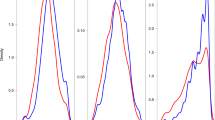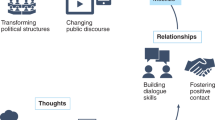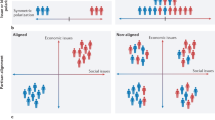Abstract
There is widespread concern that rising affective polarization—particularly dislike for outpartisans—exacerbates Americans’ anti-democratic attitudes. Accordingly, scholars and practitioners alike have invested great effort in developing depolarization interventions that reduce affective polarization. Critically, however, it remains unclear whether these interventions reduce anti-democratic attitudes, or only change sentiments towards outpartisans. Here we address this question with experimental tests (total n = 8,385) of three previously established depolarization interventions: correcting misperceptions of outpartisans, priming inter-partisan friendships and observing warm cross-partisan interactions between political leaders. While these depolarization interventions reliably reduced affective polarization, we do not find compelling evidence that these interventions reduced support for undemocratic candidates, support for partisan violence or prioritizing partisan ends over democratic means. Thus, future efforts to strengthen pro-democratic attitudes may do better if they target these outcomes directly. More broadly, these findings call into question the previously assumed causal effect of affective polarization on anti-democratic attitudes.
This is a preview of subscription content, access via your institution
Access options
Access Nature and 54 other Nature Portfolio journals
Get Nature+, our best-value online-access subscription
$29.99 / 30 days
cancel any time
Subscribe to this journal
Receive 12 digital issues and online access to articles
$119.00 per year
only $9.92 per issue
Buy this article
- Purchase on Springer Link
- Instant access to full article PDF
Prices may be subject to local taxes which are calculated during checkout



Similar content being viewed by others
Data Availability
The data for our studies are openly available via https://osf.io/n5u9d/.
Code Availability
The analysis scripts for our studies are openly available via https://osf.io/n5u9d/.
References
Iyengar, S. & Westwood, S. J. Fear and loathing across party lines: new evidence on group polarization. Am. J. Pol. Sci. 59, 690–707 (2015).
Finkel, E. J. et al. Political sectarianism in America: a poisonous cocktail of othering, aversion, and moralization. Science 370, 533–536 (2020).
Iyengar, S., Lelkes, Y., Levendusky, M., Malhotra, N. & Westwood, S. J. The origins and consequences of affective polarization in the United States. Annu. Rev. Polit. Sci. 22, 129–146 (2019).
Boxell, L., Gentzkow, M. & Shapiro, J. Cross-country trends in affective polarization. Rev. Econ. Stat. https://doi.org/10.1162/rest_a_01160 (2022).
Iyengar, S. & Krupenkin, M. The strengthening of partisan affect. Polit. Psychol. 39, 201–218 (2018).
Partisan antipathy: more intense, more personal. Pew Research Center https://www.pewresearch.org/politics/2019/10/10/the-partisan-landscape-and-views-of-the-parties/ (2019).
NBC News/Wall Street Journal Survey, Study #181259. Hart Research Associates/Public Opinion Strategies http://wsj.com/public/resources/documents/181259NBCWSJOctober2018PollFinal.pdf (2018).
Abramowitz, A. I. & Webster, S. The rise of negative partisanship and the nationalization of US elections in the 21st century. Elect. Stud. 41, 12–22 (2016).
Diermeier, D. & Li, C. Partisan affect and elite polarization. Am. Polit. Sci. Rev. 113, 277–281 (2019).
Hetherington, M. J. & Rudolph, T. J. Why Washington Won’t Work: Polarization, Political Trust, and the Governing Crisis (Univ. Chicago Press, 2015).
Klein, E. Why We’re Polarized (Simon and Schuster, 2020).
Levendusky, M. S. Our Common Bonds: Using What Americans Share to Help Bridge the Partisan Divide. Unpublished manuscript, Univ. Pennsylvania (2020).
Mason, L. Uncivil Agreement: How Politics Became Our Identity (Univ. Chicago Press, 2018).
Ahler, D. J. & Sood, G. The parties in our heads: misperceptions about party composition and their consequences. J. Polit. 80, 964–981 (2018).
Huddy, L. & Yair, O. Reducing affective polarization: warm group relations or policy compromise? Polit. Psychol. 42, 291–309 (2021).
Lees, J. & Cikara, M. Inaccurate group meta-perceptions drive negative out-group attributions in competitive contexts. Nat. Hum. Behav. 4, 279–286 (2020).
Levendusky, M. S. Americans, not partisans: can priming American national identity reduce affective polarization? J. Polit. 80, 59–70 (2018).
Moore-Berg, S. L., Ankori-Karlinsky, L. O., Hameiri, B. & Bruneau, E. Exaggerated meta-perceptions predict intergroup hostility between American political partisans. Proc. Natl Acad. Sci. USA 117, 14864–14872 (2020).
Ruggeri, K. et al. The general fault in our fault lines. Nat. Hum. Behav. 5, 1369–1380 (2021).
Simonsson, O. & Marks, J. Love thy (partisan) neighbor: brief befriending meditation reduces affective polarization. Group Process Intergroup Relat. 25, 1577–1593 (2022).
Swanson, S. By the people: the role of local deliberative forums in combating affective political polarization. The Project on International Peace and Security https://www.wm.edu/offices/global-research/_documents/pips/selene-swanson-whitepaper (2021).
Voelkel, J. G., Ren, D. & Brandt, M. J. Inclusion reduces political prejudice. J. Exp. Soc. Psychol. 95, 104149 (2021).
Warner, B. R., Horstman, H. K. & Kearney, C. C. Reducing political polarization through narrative writing. J. Appl. Commun. Res. 48, 459–477 (2020).
Wojcieszak, M. & Warner, B. R. Can interparty contact reduce affective polarization? A systematic test of different forms of intergroup contact. Polit. Commun. 37, 789–811 (2020).
Zoizner, A., Shenhav, S. R., Fogel-Dror, Y. & Sheafer, T. Strategy news is good news: how journalistic coverage of politics reduces affective polarization. Polit. Commun. 38, 604–623 (2021).
Hartman, R. et al. Interventions to reduce partisan animosity. Nat. Hum. Behav. 6, 1194–1205 (2022).
Gidron, N., Adams, J. & Horne, W. American Affective Polarization in Comparative Perspective (Cambridge Univ. Press, 2020).
Kingzette, J. et al. How affective polarization undermines support for Democratic norms. Public. Opin. Q. 85, 663–677 (2021).
Lees, J. & Cikara, M. Understanding and combating misperceived polarization. Philos. Trans. R. Soc. B 376, 20200143 (2021).
McCoy, J. & Sommer, M. Toward a theory of pernicious polarization and how it harms democracies: comparative evidence and possible remedies. Ann. Am. Acad. Pol. Soc. Sci. 681, 234–271 (2019).
Orhan, Y. E. The relationship between affective polarization and democratic backsliding: comparative evidence. Democratization 29, 714–735 (2022).
Broockman, D. E., Kalla, J. L. & Westwood, S. J. Does affective polarization undermine democratic norms or accountability? Maybe not. Am. J. Pol. Sci. https://doi.org/10.1111/ajps.12719 (2022).
Carlin, R. E. & Love, G. J. Political competition, partisanship and interpersonal trust in electoral democracies. Br. J. Polit. Sci. 48, 115–139 (2016).
Whitt, S. et al. Tribalism in America: behavioral experiments on affective polarization in the Trump era. J. Exp. Political Sci. 8, 247–259 (2021).
Graham, M. H. & Svolik, M. W. Democracy in America? Partisanship, polarization, and the robustness of support for democracy in the United States. Am. Polit. Sci. Rev. 114, 392–409 (2020).
Kalmoe, N. P. & Mason, L. Lethal mass partisanship: prevalence, correlates, and electoral contingencies. Preprint at National Capital Area Political Science Association American Politics Meeting https://www.dannyhayes.org/uploads/6/9/8/5/69858539/kalmoe___mason_ncapsa_2019_-_lethal_partisanship_-_final_lmedit.pdf (2019).
Abbink, K. & Sadrieh, A. The pleasure of being nasty. Econ. Lett. 105, 306–308 (2009).
van Doorn, J. et al. The JASP guidelines for conducting and reporting a Bayesian analysis. Psychonomic Bull. Rev. 28, 813–826 (2021).
Viechtbauer, W. Conducting meta-analyses in R with the metafor package. J. Stat. Softw. 36, 1–48 (2010).
Griffin, J. W. Calculating statistical power for meta-analysis using metapower. Quant. Method Psychol. 17, 24–39 (2021).
Gift, K. & Gift, T. Does politics influence hiring? Evidence from a randomized experiment. Polit. Behav. 37, 653–675 (2015).
McConnell, C., Margalit, Y., Malhotra, N. & Levendusky, M. The economic consequences of partisanship in a polarized era. Am. J. Pol. Sci. 62, 5–18 (2018).
Cassese, E. C. Partisan dehumanization in American politics. Polit. Behav. 43, 29–50 (2021).
Uscinski, J. E. et al. American politics in two dimensions: partisan and ideological identities versus anti‐establishment orientations. Am. J. Pol. Sci. 65, 877–895 (2021).
Bougher, L. D. The correlates of discord: identity, issue alignment, and political hostility in polarized America. Polit. Behav. 39, 731–762 (2017).
Mason, L. A cross-cutting calm: how social sorting drives affective polarization. Public Opin. Q. 80, 351–377 (2016).
Santos, L. A., Voelkel, J. G., Willer, R. & Zaki, J. Belief in the utility of cross-partisan empathy reduces partisan animosity and facilitates political persuasion. Psychol. Sci. 33, 1557–1573 (2022).
Simas, E. N., Clifford, S. & Kirkland, J. H. How empathic concern fuels political polarization. Am. Polit. Sci. Rev. 114, 258–269 (2020).
Bartels, L. M. Ethnic antagonism erodes Republicans’ commitment to democracy. Proc. Natl Acad. Sci. USA 117, 22752–22759 (2020).
Faul, F., Erdfelder, E., Buchner, A. & Lang, A. G. Statistical power analyses using G*Power 3.1: tests for correlation and regression analyses. Behav. Res. Methods 41, 1149–1160 (2009).
Groenendyk, E. Competing motives in a polarized electorate: political responsiveness, identity defensiveness, and the rise of partisan antipathy. Polit. Psychol. 39, 159–171 (2018).
Acknowledgements
The authors received funding for this project from the Civic Health Project (R.W.), the Stanford Center on Philanthropy and Civil Society (R.W.) and the Institute for Policy Research, Northwestern University (J.N.D.). This work is supported under a Stanford Interdisciplinary Graduate Fellowship (J.G.V.). The funders had no role in study design, data collection and analysis, decision to publish or preparation of the manuscript.
Author information
Authors and Affiliations
Contributions
J.G.V., J.C., M.N.S., J.S.M., C.R., S.L.P., J.N.D., D.G.R. and R.W. designed the studies. J.G.V., J.C., M.N.S., J.S.M., C.R., S.L.P. and R.W. collected the data. J.G.V. analysed the data. J.G.V. and D.G.R. wrote the manuscript. J.C., M.N.S., J.N.D. and R.W. provided comments on the manuscript.
Corresponding authors
Ethics declarations
Competing interests
The authors declare no competing interests.
Peer review
Peer review information
Nature Human Behaviour thanks Eric Groenendyk, Omer Yair and Magdalena Wojcieszak for their contribution to the peer review of this work. Peer reviewer reports are available.
Additional information
Publisher’s note Springer Nature remains neutral with regard to jurisdictional claims in published maps and institutional affiliations.
Supplementary information
Supplementary Information
Supplementary information on pilot study 1, supplementary information on pilot study 2, supplementary information on descriptive statistics, supplementary information on main and moderating effects of partisan identity, supplementary information on correlational statistics for the joy-of-destruction game, Tables 1–21 and Figs. 1–18c.
Rights and permissions
Springer Nature or its licensor holds exclusive rights to this article under a publishing agreement with the author(s) or other rightsholder(s); author self-archiving of the accepted manuscript version of this article is solely governed by the terms of such publishing agreement and applicable law.
About this article
Cite this article
Voelkel, J.G., Chu, J., Stagnaro, M.N. et al. Interventions reducing affective polarization do not necessarily improve anti-democratic attitudes. Nat Hum Behav 7, 55–64 (2023). https://doi.org/10.1038/s41562-022-01466-9
Received:
Accepted:
Published:
Issue Date:
DOI: https://doi.org/10.1038/s41562-022-01466-9
This article is cited by
-
Partisan styles of self-presentation in U.S. Twitter bios
Scientific Reports (2024)
-
Why voters who value democracy participate in democratic backsliding
Nature Human Behaviour (2023)



